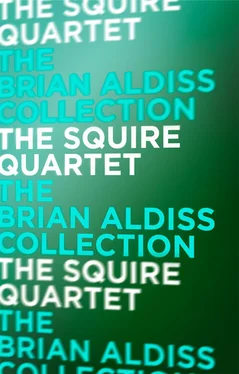‘Why was Kchevov invited to the conference?’ Rotheray asked.
‘He wasn’t. He just turned up. Nothing unusual in that.’ Squire thought for a while and then said, ‘Violin apart, Kchevov has about as much connection with the arts as Pavlov has with Pavlova. There must be hundreds of his type crawling round England and Western Europe, worse luck. So what about Rugorsky? He’s the one who really interests me.’
‘Vasili Rugorsky. Age fifty. Prematurely grey. He met you in London in 1970, according to the records,’ Parker-Smith said.
‘Correct. Unlike Kchevov, he is a man of genuine culture. I was told he has made liberal gestures in his time. In particular, he spent several years in hard labour in the Gulag, back in Joe Stalin’s day, for writing a poem which offended the authorities.’
Parker-Smith nodded. ‘Our records aren’t precise that far back. We think that Stalin commuted the sentence. If so, that’s unusual. Seen in Moscow late 1947, then no notice of whereabouts for some years. Back on katorga in 1950. But in 1956 he is working again as a biologist. That’s his qualification. Continues at Irkutsk Institute of Biological Sciences until ’70, when he moves to Leningrad.’
‘Poem forgiven. Conformity achieved?’
‘The poem itself is interesting,’ Rotheray said, leaning forward in his chair. ‘“Winter Celebration”. They sent us a copy of it in translation with the other details. It likens the Soviet community to a sort of medieval feast with a great hog’s head steaming on a platter as main attraction. Stalin evidently didn’t care for the comparison. For a British reader, it’s difficult to tell whether Rugorsky was being slyly satirical or clumsily attempting flattery.’
As Parker-Smith began reciting more facts, Squire broke in, saying, ‘Rugorsky looks a bit like a hog’s head himself, which suggests a new line in literary criticism. Rather a fleshy face, hectic colour, protruding nose. He spoke to me at lunch about the duties of those who can still distinguish between true and false. Made what I took to be veiled anti-Soviet remarks. Keen to establish contact. I had the same impression in London in 1970. Despite his history, he moves fairly freely in the West, even if he’s stuck with Kchevov as a watchdog this time. He flew here straight from Moscow via Rome, you say?’
‘I didn’t say that,’ Parker-Smith said. ‘He had twenty-four hours on the loose in Rome between flights. We don’t know what he did. Brothels is the standard thing, of course.’
‘Home life?’
Parker-Smith condescended to peep at his sheet of paper. ‘Wife and two sons, now aged between twenty-five and thirty, both pukka Party members. Four-room flat in Leningrad suburb near university. He’s probably perfectly loyal to the system, if that’s what you’re thinking about. He knows the bosses and their psychology, they know him, everyone’s happy. They accept his style, he makes good propaganda for them abroad as a cultured broad-minded chappie quite ready to criticize shortcomings of government system, just like any Westerner. Or Yevtushenko.’
‘Or like some of our buggers, who go abroad and run down the British system in every way, before returning to cushy jobs and free education for the kiddies,’ Squire said. A thought struck him. ‘Rugorsky’s not likely to be a genuine dissatisfied customer, preparing to defect, as far as you know?’
Pursing his lips, Parker-Smith shook his head very slightly.
‘Look, if Rugorsky wants to defect – surprising how many Russians at the age of the male menopause do hop it – he’d be best advised to do so in Rome, not Ermalpa. Aeroflot doesn’t fly here, so he’s booked back to Rome via Alitalia next Monday morning – same flight as you, as it happens. He changes planes at Leonardo da Vinci, where he has a four-hour wait before catching the Aeroflot plane on to Moscow. In that breathing space, he could give Kchevov the shake if he wished, and head for the US Embassy.’
‘If he did make a break for it here in Ermalpa,’ Rotheray said, ‘he’d still be best advised to run for the American Consulate. We don’t want him here. Our stock with the Russians is low enough for them to break in here and grab him – aided by fixed local police, let me add. No, as Howard says, Rome’s his best bet.’ He rubbed his hands together and laughed.
Seriousness prevailed with Parker-Smith. ‘I’d guess he’s just a hanger-on of the system, Mr Squire. Plays both sides. Likes to make a few mildly anti-Soviet remarks, knowing they go down well with his hosts in the West, and makes him think he has integrity.’
‘Good. We know where we stand. Now, did you get me anything on Herman Fittich, Professor of Literature in the University of Bad Neustadt?’
‘Nothing exciting. Was conscripted at the age of fifteen into the Wehrmacht to defend Berlin in its last days. Mother raped and killed by Soviet Army of Glorious Liberation during that time. Quiet life since then. Holidays in Britain. Not a joiner, apparently. Good English, papers published in learned American journals. What were you hoping for?’
‘Just what you’ve given me. The detail about his mother is informative. I like Fittich. I think he’s just what I think he is, a serious and honourable man who does not much care for the present state of the world. Rugorsky is more of a mystery. But I expect you’re right; he’s probably harmless.’
Tucking the still-folded sheet of paper back in his pocket, Parker-Smith stubbed out the remains of his cigarette, drained his glass, and stood up. ‘If you learn anything of interest, do let us know. It all fits into a larger picture. If I can be of any further help, give me a ring.’
They shook hands and Parker-Smith faded politely away.
‘So much for business,’ Rotheray said, looking at his watch. ‘Now for something more social – more my line, I’m afraid. Anything else we can help you with while you’re here?’
‘No, thanks, James. It’s just a fairly ordinary quasi-academic congress, crawling with Lefties, as you’d expect. There’s an interesting American woman who arrived via West Germany, very cool and elegant but underneath very mixed-up, I suspect. Perhaps a real sympathy with the oppressed but it’s been channelled into Marxist lines and has withered under a stream of orthodox phraseology. She feels herself in some way trapped and cheated.’
‘What age?’
‘Oh, she’d be about – early forties. Well-preserved. Has a very cleansed, bare, even barren, appearance. Thinks that just to see a human brain lying in its shell is enough to banish thoughts of God and the human soul. I suspect a deep puritanism as regards sex and the flesh – a feeling she projects onto me. Americans nearly always reflexively suspect the English of puritanism. A strabismus in their history education. She hid it by talking nonchalantly about brothels.’
‘There are no good brothels in Ermalpa,’ said Rotheray. ‘So I’m told. All the attractive whores go to Palermo or Naples or Rome. They return here only when they’re old and desperately in need of a re-bore. Anyhow, how’s Teresa?’
‘Hasn’t your secret service been keeping you informed? We broke up last summer, during the heat wave. Haven’t quite managed to get things together again since.’
‘I am sorry, Tommy. You and Teresa were always such a jolly pair. Why, you knew each other when we were up at King’s and she was at Newnham. She’s got a slight squint, hasn’t she?’
‘No.’
‘My mistake. Sorry. To be honest, I did hear a whisper, but I hoped it was all over. Difficult creatures, women, I’ve always found. Is this Marxist American woman nice?’
‘Oh, she’s nothing to do with me.’
‘I thought you sounded interested. Well, let’s go and see about dinner. I hope that’ll cheer you up a bit.’
Читать дальше












